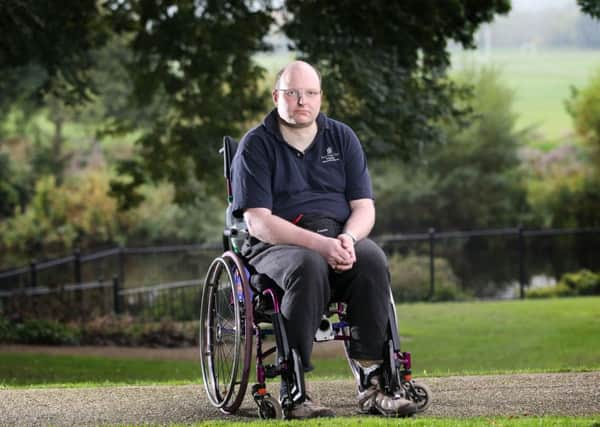Disabled passengers must wait for bus ruling on whether wheelchairs have priority over prams


The case was triggered when wheelchair user Doug Paulley attempted to board a bus operated by FirstGroup which had a sign saying: ‘’Please give up this space if needed for a wheelchair user.’’
Mr Paulley, 38, was left behind at the stop because a woman with a sleeping baby in a pushchair refused to move out of the designated area when asked by the bus driver, saying the buggy would not fold.
Advertisement
Hide AdAdvertisement
Hide AdFirstGroup has a policy of ‘’requesting but not requiring’’ non-disabled travellers, including those with babies and pushchairs, to vacate the space if it is needed by a wheelchair user.
A judge at Leeds County Court ruled the policy breached FirstGroup’s duty under the Equality Act 2010 to make “reasonable adjustments” for disabled people and awarded Mr Paulley £5,500 in damages.
Recorder Paul Isaacs said the bus company policy should have “required” the woman to move and the wheelchair user’s right to priority should have been enforced.
But the recorder’s judgment was overturned by the appeal court, which ruled the adoption of such a policy would not strike a fair balance between the needs of wheelchair users and the needs of other passengers who might be vulnerable. The policy would also be liable to give rise to confrontation and delayed journeys.
Advertisement
Hide AdAdvertisement
Hide AdMr Paulley took the case before seven Supreme Court justices for a final, definitive ruling. After a one-day hearing on Wednesday, court president Lord Neuberger said judgment would be handed down at a later date.
Before the hearing, Mr Paulley said: “This is the first time the Supreme Court has considered a disability discrimination case relating to the provision of goods and services.
“We are seeking a clear ruling that bus companies have to do more to make it likely that wheelchair users will be able to travel.
“We also need a change in culture so that people with pushchairs realise they have to move out of these spaces for wheelchairs so that situations become less of a crunch point and confrontational.”
Advertisement
Hide AdAdvertisement
Hide AdRobin Allen QC, representing Mr Paulley at the Supreme Court, told the judges it was accepted that wheelchair spaces could be used by others “when not required for wheelchairs”, but wheelchair users were entitled to priority.
If other passengers “utterly refused” to accept the “proper order of expectation” then that priority had to be enforced, said Mr Allen.
He rejected arguments that enforcement was both impossible legally and very difficult in practice, saying: “It is not impossible legally and it is not that difficult in practice.”
There are some 1.2 million wheelchair users, amounting to about 2% of the UK population.
Advertisement
Hide AdAdvertisement
Hide AdThe QC said it was not right to identify the problem as a competition for space between wheelchair users and parents with buggies, because wheelchair users had been given the right to wheelchair space by Parliament.
Mr Allen said: “We say we have a particular problem as wheelchair users and we have been given a particular solution, and we do object to the solution to other problems being grafted on in some way that undermines the strength of the solution we say Parliament has given through various bits of legislation set out in our case.”
He said discussions on the internet conducted by Mumsnet showed “there is no move among parents with buggies to say they should have equal or better rights to this space”.
Martin Chamberlain QC, appearing for FirstGroup, said there had been no unlawful discrimination against Mr Paulley.
Advertisement
Hide AdAdvertisement
Hide AdHe argued that requiring passengers occupying the wheelchair space to move if it was needed by wheelchair users “regardless of circumstances”, and under threat of ejection from the bus, was “not a reasonable adjustment” under the Equality Act.